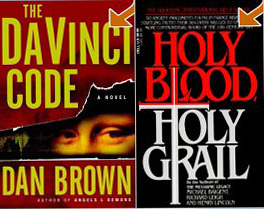
Two of the authors of “Holy Blood, Holy Grail,” recently lost their copyright infringement suit against genre thriller author, Dan Brown, for his book the “Da Vinci Code.” Brown heavily relied on the theories of the secret lineage of Jesus found in Holy Blood (a best seller in its own time.) Both books were published by Random House, but that did not stop Michael Baigent and Richard Leigh from suing their own publisher for copyright infringement. A judge found that Baigent and Leigh could not prove (or even define) the central themes of their book were stolen and further did not think it was a good idea to have authors of “pretend historical books” scour over fiction works looking for stolen ideas.
Mark Stephens, a media lawyer for the losing side lawyer stated:
“Whilst the decision shows that he didn’t infringe copyright, his moral behavior is more, in my view, open to question. It’s clear that he used the fundamental themes and ideas of ‘Holy Blood, Holy Grail,’ and many people will think that morally, Dan Brown owes a debt to Baigent, Leigh and Lincoln.”
Of course, Dan Brown owes a “creative” debt to the authors of Holy Blood, Holy Grail. Just like all fiction authors who use non-fiction (and in this case, I’m using the word loosely), own a debt to the research they do. Claims for compensation for it goes against the centuries old traditions of how culture is created.
Aside note: In my original search, for my post on the Da Vinci code, I mistyped “Devinci Code” in the nytimes.com search, and come up with this:

The nytimes.com article search engine couldn’t find anything. Amusingly, it suggested I was searching for “deviancy code.” Maybe it knows something I do not. And of course, the related sponsor ads on the top and right hand side, showed correctly identified and relevant links.
if:book
A Project of the Institute for the Future of the Book
